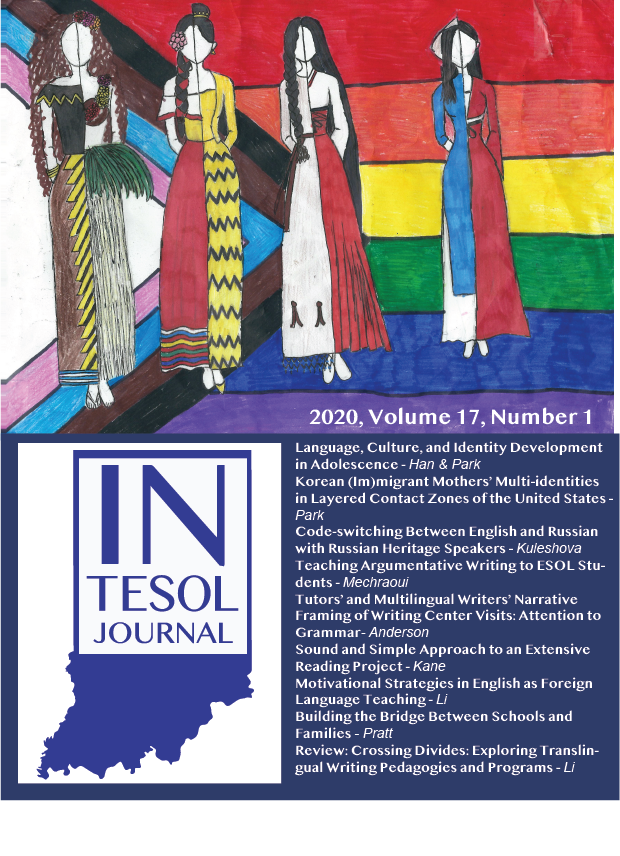Tutors’ and Multilingual Writers’ Narrative Framing of Writing Center Visits
Attention to Grammar
DOI:
https://doi.org/10.18060/24417Keywords:
multilingual, writing, writing center, longitudinal, first-year, narrative, perceptionsAbstract
This study explores how first-year multilingual writers in a classroom community make sense of their first university writing center visits. Employing narrative analysis of student journals, this study illustrates differences in themes writers discuss in their narratives of first writing center visits and themes in self-reflections on their writing. Comparing narratives in student journals and tutor report forms, this study also presents the congruities and discrepancies between writer and tutor views of a session. Writer emphasis on grammar when narrating writing center visits contrasts with writer emphasis on development in self-reflections on their writing. When tutor and writer session descriptions differ, tutors emphasize discussion of development and organization while writers emphasize sentence-level accuracy. Without scaffolding of strategies for writing center use, first-year multilingual writers may privilege sentence-level feedback in their early understanding of the writing center, resulting in a more limited experience of writing center support.
References
Barkhuizen, G. (2011). Narrative knowledging in TESOL. TESOL Quarterly, 45(3), 391-414. https://doi.org/10.5054/tq.2011.261888
Bell, J. S. (2002). Narrative research in TESOL: Narrative inquiry: More than just telling stories. TESOL Quarterly, 36(2), 207-213. https://doi.org/10.2307/3588331
Braun, V., & Clarke, V. (2006). Using thematic analysis in psychology. Qualitative Research in Psychology, 3(2), 77-101. https://doi.org/10.1191/1478088706qp063oa
Bruce, S. (2009). Listening to and learning from ESL writers. In S. Bruce & B. Rafoth (Eds.), ESL writers: A guide for writing center tutors (2nd ed., pp. 217–229). Boynton/Cook Publishers.
Chen, C. W. Y. (2010). Graduate students’ self-reported perspectives regarding peer feedback and feedback from writing consultants. Asia Pacific Education Review, 11(2), 151-158. https://doi.org/10.1007/s12564-010-9081-5
Cirillo-McCarthy, E., Del Russo, C., & Leahy, E. (2016). “We don't do that here”: Calling out deficit discourse in the writing center to reframe multilingual graduate support. Praxis: A Writing Center Journal, 14(1), 62-71.
Eckstein, G. (2016). Grammar correction in the writing centre: Expectations and experiences of monolingual and multilingual writers. Canadian Modern Language Review, 72(3), 360-382. https://doi.org/10.3138/cmlr.3605
Eckstein, G. (2018). Goals for a writing center tutorial: Differences among native, non-native, and generation 1.5 writers. WLN: A Journal of Writing Center Scholarship, 42(7-8), 17-24.
Ewert, D. E. (2009) L2 writing conferences: Investigating teacher talk. Journal of Second Language Writing, 18(4), 251-269. https://doi.org/10.1016/j.jslw.2009.06.002
Greenfield, L. (2011). The “standard English” fairy tale: A rhetorical analysis of racist pedagogies and commonplace assumptions about language diversity. In L. Greenfield & K. Rowan (Eds.), Writing centers and the new racism: A call for sustainable dialogue and change (pp. 33-60), Utah State University Press.
Hadingham, Oliver. (2017) Review: Tutoring Second Language Writers. Journal of Second Language Writing, 38, 20-22. https://doi.org/10.1016/j.jslw.2017.10.001
Han, Y., & Hyland, F. (2016). Oral corrective feedback on L2 writing from a sociocultural perspective: A case study on two writing conferences in a Chinese university. Writing & Pedagogy, 8(3), 433-459. https://doi.org/10.1558/wap.27165
Kormos, J. (2012). The role of individual differences in L2 writing. Journal of Second Language Writing, 21(4), 390-403. https://doi.org/10.1016/j.jslw.2012.09.003
Nakamaru, S. (2010). Lexical issues in writing center tutorials with international and US-educated multilingual writers. Journal of Second Language Writing, 19(2), 95-113. https://doi.org/10.1016/j.jslw.2010.01.001
Malenczyk, R. (2013). "I thought I’d put that in to amuse you": Tutor reports as organizational narrative. The Writing Center Journal, 33(1), 74-95.
Minett, A. (2009). ‘Earth aches by midnight. Helping ESL writers clarify their intended meaning. In S. Bruce & B. Rafoth (Eds.), ESL writers: A guide for writing center tutors (pp. 66–77). Boynton/Cook Publishers.
Okuda, T. (2019). Student perceptions of non-native English speaking tutors at a writing center in Japan. Journal of Second Language Writing, 44(2), 13-22. https://doi.org/10.1016/j.jslw.2019.01.002
Olson, B. (2013). Rethinking our work with multilingual writers: The ethics and responsibility of language teaching in the writing center. Praxis: A Writing Center Journal, 10(2), 1-6. https://doi.org/10.15781/t2g15tt1t
Pomerantz, A., & Kearney, E. (2012). Beyond ‘write-talk-revise-(repeat)’: Using narrative to understand one multilingual student's interactions around writing. Journal of Second Language Writing, 21(3), 221-238. https://doi.org/10.1016/j.jslw.2012.05.013
Praphan, P., & Seong, G. (2016). Helping second language writers become self-editors. In S. Bruce & B. Raforth (Eds.), Tutoring second language writers (pp. 235-258). Utah State University Press.
Qian, J., & Krugly-Smolska, E. (2008). Chinese graduate students' experiences with writing a literature review. TESL Canada Journal, 26(1), 68-86. https://doi.org/10.18806/tesl.v26i1.391
Severino, C. (2009). Avoiding appropriation. In S. Bruce & B. Raforth (Eds.), ESL writers: A guide for writing center tutors (pp. 48-60). Boynton/Cook Publishers.
Severino, C., Swenson, J., & Zhu, J. (2009). A comparison of online feedback requests by non-native English-speaking and native English-speaking writers. The Writing Center Journal, 29(1), 106-129.
Thonus, T. (2014). Tutoring multilingual students: Shattering the myths. Journal of College Reading and Learning, 44(2), 200-213. https://doi.org/10.1080/10790195.2014.906233
Yu, L. (2020). Investigating L2 writing through tutor-tutee interactions and revisions: A case study of a multilingual writer in EAP tutorials. Journal of Second Language Writing, 48, 1-14. https://doi.org/10.1016/j.jslw.2019.100709
Vásquez, C. (2011). TESOL, teacher identity, and the need for “small story” research. TESOL Quarterly, 45(3), 535-545. https://doi.org/10.5054/tq.2011.256800
Downloads
Published
Issue
Section
License
Copyright (c) 2020 Salena Anderson

This work is licensed under a Creative Commons Attribution-NonCommercial 4.0 International License.


